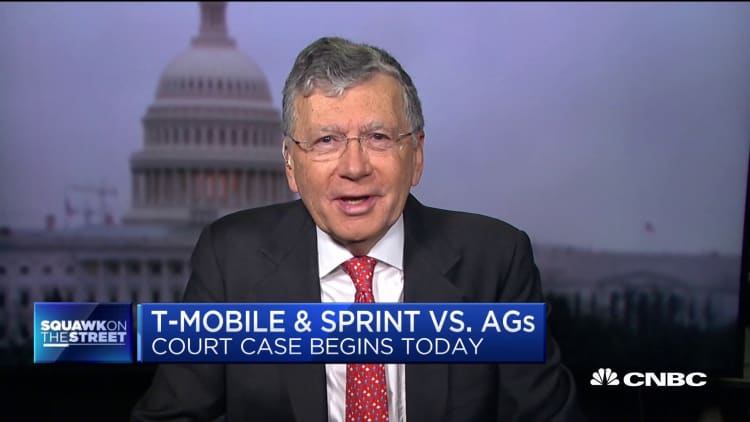
The U.S. needs to make it easier to build robust 5G networks as foreign rivals such as China have significant advantages around the next-generation wireless technology, former FCC Chairman Reed Hundt told CNBC on Monday. 5G is a next-generation mobile network that promises fast data speeds and other capabilities to support emerging technologies such as self-driving cars.
"It's a national imperative," Hundt, who led the agency from 1993 to 1997, said on "Squawk on the Street."
The federal government holds the keys to unlocking 5G deployment in two ways, he said.
The first, more immediate way, rests in the ongoing federal trial around the pending merger of T-Mobile and Sprint. The case, brought by 14 state attorneys general, argues both the Department of Justice and the Federal Communications Commission were wrong to approve the deal, claiming it would decrease wireless competition and harm consumers.
Hundt said U.S. Judge Victor Marrero should reject the states' argument, largely because the merger would allow for 5G networks to more easily be brought to market.
"This trial is very, very much about who will be able to get spectrum to build these 5G networks," said Hundt, who is now CEO of the Coalition for Green Capital, which advocates for greater investment in renewable energy.
Hundt was referencing the DOJ's settlement with T-Mobile and Sprint, which includes provisions that proponents argue will facilitate Dish's ability to build 5G networks.
Dish has an agreement with the Federal Communications Commission to establish a 5G broadband network that it says will reach 70% of the U.S. population by June 2023. If it fails to meet that deadline, it will pay the U.S. Treasury up to $2.2 billion.
The second way in which the government can unlock nationwide 5G is if the FCC releases additional 5G spectrum from the "regulatory swamp," so that companies could buy it to further build out networks, Hundt said. Hundt also said the U.S. military should release its 5G spectrum to the private sector.
"We have to hurry up in this country and solve our own political and regulatory problems to get that 5G spectrum deployed," he said.


